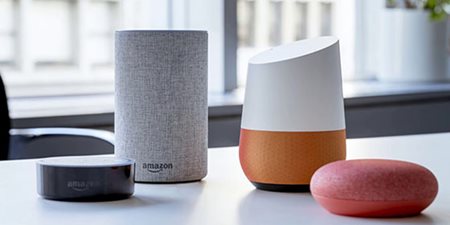Voice Technology is Not Coming, It is Already Here
By Laura Myers
January 29, 2019
Acquia, Episerver, Falcon-Software, Marketing, TSL, Voice, voice assistants, Voice Marketing, voice search, Voicify
The voice wars are on. Amazon Alexa has commerce in her corner, Siri lives in most of our pockets, and  Google Home has its search capabilities locked-in. Unfortunately, too many brands are watching these technologies duke it out, letting the time they should be using to develop their own voice strategy pass them by. Maybe they’re waiting for someone in their market to jump into the voice game first to show them the way. Maybe they’re waiting for the creative genius of conversational technology to grace them with its presence. The key issue here is that they’re waiting when they should be moving on it, and moving on it now.
Google Home has its search capabilities locked-in. Unfortunately, too many brands are watching these technologies duke it out, letting the time they should be using to develop their own voice strategy pass them by. Maybe they’re waiting for someone in their market to jump into the voice game first to show them the way. Maybe they’re waiting for the creative genius of conversational technology to grace them with its presence. The key issue here is that they’re waiting when they should be moving on it, and moving on it now.
If you look around at what the experts are saying, voice will become ubiquitous. Voice will become the next major user interface. Its applications will span search, eCommerce, marketing, human resources, productivity, nearly all business processes, and when it comes to verticals, it’s already being put to use in disruptive ways in more than I could list here. If you sit back and think about the ease of use it offers, as well as its savvy to inherently connect with human nature, you’ll begin to understand its power.
Over the last year, the emergence of voice has colored many conversations we’ve had with folks around the industry; touching on its future use-cases, how it will weigh in on the competive landscape within each market, and how it will change the game for consumer engagement from here on out. While on-site at Sitecore Symposium, we even met Jeff McMahon, CEO at Voicify, who explained the opportunity he saw to help make voice accessible for brands who perhaps previously thought it was out of their scope: “We saw voice coming along and we saw an opportunity to help brands connect with their customers through voice, through Amazon Alexa, Google Home, etc. by making the hurdle to get into that space a lot lower. So the two things we are really doing is allowing non-technical folks—marketers—to create voice experiences on our platform, and then the second thing we are doing is then pushing that experience out to several different platforms. So Google, Amazon, Microsoft Cortana, chatbots etc.. So instead of having to have separate development teams working on all of those, you can manage it all very easily on our platform.”
Voice Search Will Shake Up SEO
This area is perhaps one of the biggest areas of focus for those wading into the voice foray. It also makes me feel for the SEO experts who already are tasked with keeping up with everything SEO demands, and now voice stands to come in and change it all again. This also may be one of the biggest ways brands could get left in the dust by sleeping on a voice search strategy:
“If you’re not thinking about voice now, it’s coming very quickly, and I would argue it’s already here. 50% of all searches by 2020 will be voice searches, so you need to be thinking about it because if you don’t have a strategy around that, and someone is searching for your product, and you don’t have a voice app on Google and Alexa, and all these different platforms, either you’ll get one of two answers. The worst scenario is your competitor actually has an app and is answering that question, or it’ll come back as saying ‘I don’t know, I don’t know what that product is, sorry.’. Neither one of those are very good.”—Jeff McMahon CEO at Voicify
“A big part of the future is optimizing for voice search, and this will be extremely important over the next couple of years since it has been predicted that 50% of all search queries will be voice by 2020. This means optimizing the site for long tail keywords, phrases, and questions that people are asking. This prediction is based off the growth of voice that has been seen in recent years. A big reason for this is the advancement of mobile devices like phones and smart watches, as well as devices like Google Home and Alexa which are becoming much more commonly seen in people's homes.”—Shawn Rosko, Senior SEO Manager at TSL Marketing
Voice Across eCommerce, CMS and Marketing
The reasons that voice is such a powerful touchpoint are widely known. Nevertheless, its application across disciplines will vary given how each team should leverage the best use case for their needs. Below, we have experts weigh in on voice for marketers, eCommerce teams, and those immersed in the CMS world.
"As AI and voice assistants continue to grow in popularity, brands can ensure their strategy is optimized for this new technology by getting to know their buyers, continuing to offer immersive experiences, and creating realistic goals. Before preparing a voice-assisted search strategy, marketers must look at consumers and determine if they even have a presence on voice-enabled devices. We also suggest marketers begin to experiment with this technology to determine how it performs for them. By using A/B testing, marketers can determine if messages are resonating better via voice, mobile app, or browser. Once marketers examine all of their options, they can make an informed decision on how voice-enabled tech will work for their goals.
As consumers get more comfortable using these devices, marketers need to be prepared for how this technology will impact commerce, search and marketing strategies moving forward. The brands and merchants who take the lead in voice-enabled shopping will have an advantage by allowing consumers to explore shopping channels outside of browser and mobile apps. Consumers shop on a plethora of devices already, and this is only going to increase in the years to come." - Preston So, Director of Research and Innovation at Acquia
“Voice commerce is the interaction with a device and an eCommerce site, where there is no screen to engage with. If you think about Amazon Echo or Google Home, we are getting more and more comfortable speaking to devices and performing certain tasks. I think it will transform certain parts of eCommerce such as repetitive orders, or things you have already put on to your shopping list and having them sent home or reordered. There is still a need for traditional eCommerce experiences, but the way that voice commerce will augment how we shop and provide convenience is where you are going to see a lot of growth this year.” - Ed Kennedy, Commerce Strategist at Episerver
“The rise and adoption of AI features like chatbots and voice are becoming increasingly important across all digital platforms, including your CMS system. Enter Microdata, a specific type of data published on a website that will allow search engines, like Google, to read and interpret. If understood, it can be included in search results from questions by both text and —more increasingly—by voice search. As answer-driven over information-driven searches increase with the use of assistants like Siri and Google Assistant, metadata results will rise in priority, as will the requirement of your CMS to optimize microdata for your content to ensure these are served up in relevance to your business's products and services.”- Lynette Sawyer, Web Project Manager at Falcon-Software
Ending Notes
As a marketer, I definitely focus on the way voice will be able to ramp-up the engagement factor and allow more brands to exist more seamlessly in their customer’s lives. Further to that, I think the way that voice can offer a major advantage is with voice search. If you consider that today, when you search through your mobile phone or desktop, you’re browsing a list of maybe seven to ten top entries. When it comes to voice, you might get the top three, if that, or it might just be one. If marketers can understand how to position themselves in the top results for a common voice query, it will give them a significant advantage over the competition who put off executing a good VoSEO strategy (VoSEO being Voice Search Engine Optimization. I don’t know if that’s a thing yet. Google tells me VSEO stands for Video Search Engine Optimization, so I got creative).
I also consider all of the keyword data that could exist since search queries could be processed from conversational speech as opposed to text input questions. Spoken sentences contain more words, so there is greater opportunity to hit on a keyword when a person is speaking at a rate of 150 words per minute versus the person who might type an average of 40 words per minute. Personally, when I reflect on what voice search can teach us with regard to how consumers are asking about certain products or services—more words being expressed in multiple inquiries—marketers may end up with a whole lot more data to work with.

Laura Myers
A digital business, marketing and social media enthusiast, Laura thrives on asking unique, insightful questions to ignite conversation. At an event or remotely, she enjoys any opportunity to connect with like-minded people in the industry.